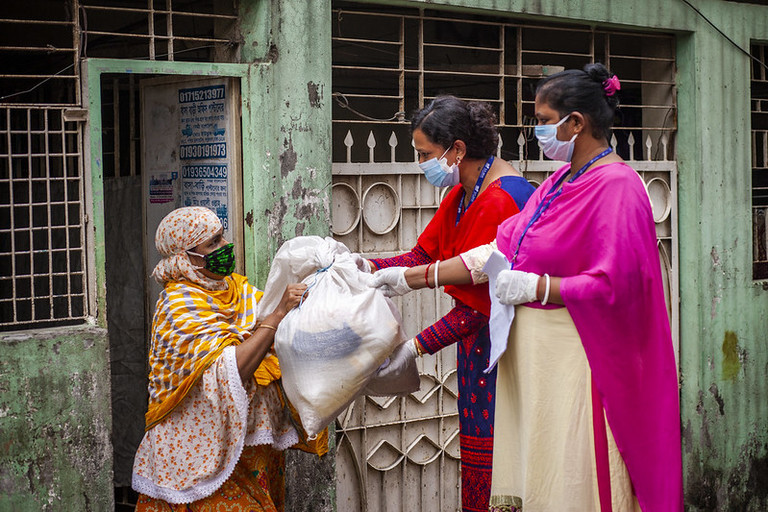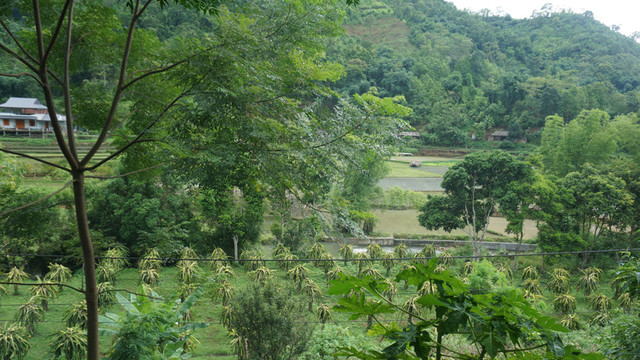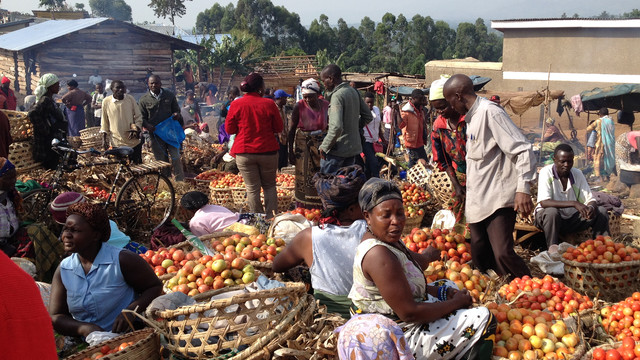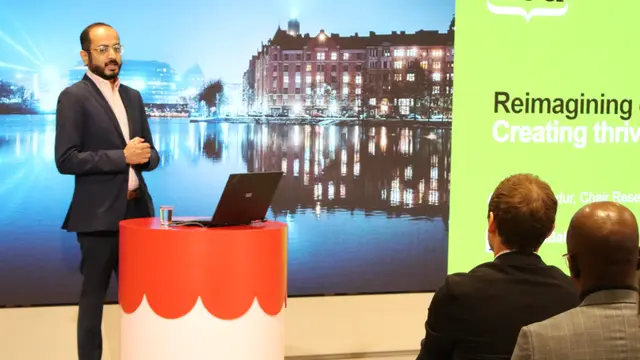Climate justice needs vaccine justice
Andrew Norton reflects on the inequalities faced by developing countries in accessing vaccines and says the world needs fair and inclusive responses to the pandemic in order to effectively respond to climate change and achieve a green recovery.


Evidence shows that people in urban informal settlements fear that cost may prevent them from accessing vaccines. A survey in Bangladesh found that the average per capita expenditure in 2020 decreased by 45% for the poorest households (Photo: UN Women Asia and the Pacific, via Flickr, CC BY-NC-ND 2.0)
The current trajectory for the global roll out of COVID-19 vaccines is shockingly unequal. As of December, a group of campaigning organisations claimed that rich countries had secured commitments to enough doses of the various vaccines in the pipeline to vaccinate their entire populations three times over – while nearly 70 poor countries may only be able to vaccinate one in 10 of their populations.
Indeed, the target of the COVAX initiative to roll out vaccination in developing countries indicates only ‘at least 20% coverage’, while most rich countries are aiming for full adult coverage.
As of now, the data suggests that the countries most affected by the pandemic in terms of mortality are OECD countries. All 10 of the countries with the highest recorded death rates from COVID-19 are rich countries. Many countries in East Asia and Africa have done better in terms of containing the pandemic’s impact on mortality than most OECD countries.
Not all developing countries have escaped this, however, with many countries in Latin America severely affected. And particular contexts have also suffered dreadfully. In July, residents of three informal settlements in Mumbai were found to have a 50% infection rate while only 16% of people living outside slums in the same areas tested positive.
Aside from direct health effects, many countries in the global South have been hugely affected socially and economically, as lockdowns and travel restrictions have deprived many, particularly in the urban informal sector, of any source of support, and dramatically reduced access to education, exposed many women to a greater risk of domestic violence, as well as a range of other effects.
Those countries and communities that depend on international tourism have seen their livelihoods effectively destroyed.
The reasons why many countries in East Asia and Africa have done relatively well in managing the pandemic itself may relate to demographics (relatively young populations) and to degrees of immunity conferred by exposure to other diseases. It is also important to recognise that many developing countries have responded very effectively in both policy and practice.
Developing countries with prior experience of severely threatening epidemics (such as SARS and Ebola) were better prepared to implement effective and locally-run test, trace and isolate systems than many rich countries. Experience of community engagement, multi-layered governance and inclusive support by states to ‘bottom up’ local organisations is also proving important in many countries.
But if rich countries dominate systems for vaccine supply then this picture could easily change, with infections continuing to grow in poorer countries that are unable to obtain enough vaccine supplies to control the pandemic, while rich countries move towards widespread adult vaccination.
Increasing inequality
This trajectory is not certain as there are many other factors which determine the effectiveness of pandemic response, but it is a clear risk. Aside from the implications for global health inequality, this could also exacerbate the already alarming trends towards increasing country-level income and wealth inequality caused by the pandemic.
In short, if rich countries are able to restart economic activity and poor countries aren’t, that will be increase inequality between countries. It will be damaging to livelihoods in the global South, to the future of children who won’t get schooling, to the lives of women who are picking up the care burdens of the pandemic and in many cases suffering from being trapped in abusive situations.
There is also damage to countries’ democratic cultures when elections are delayed, and when public protest can be suppressed on health grounds.
Oxfam’s recent report on the impacts of the pandemic on inequality lays out a grim picture. While it took just nine months for the world’s top 1,000 billionaires to recoup their pandemic losses, for the world’s poorest people recovery could take a decade. The report calculates that the increase in the 10 richest billionaires’ wealth amounts to enough (£400bn) to ensure that the entire global population is vaccinated.
On the basis of responses from 295 economists in 79 countries, the report makes a startling observation – that the pandemic event may mark the first time in recorded history that inequality has risen in all countries simultaneously.
It is difficult to get a clear picture from many countries of the extent of the impact, in part because field studies are so difficult in the pandemic. In Bangladesh, a telephone survey followed up respondents from a 2018 household survey and found that the average per capita expenditure in 2020 decreased by 45% for the poorest households.
If livelihoods and societies are to recover then vaccine justice will be critical. This applies both to the different levels of access between countries, but also to the conditions of access within countries. Recent research shows that many people in urban informal settlements fear that issues of cost and corruption may prevent them from accessing vaccines.
It is not acceptable that the world plans for full COVID-19 immunisation to take place only in wealthy countries. The UK is the largest contributor to the COVAX initiative – and that should be applauded. But no rich country is doing enough as of now to support both vaccine delivery and other broader community-engaged response measures that have proved to be important in responding to the pandemic.
COVID and the climate crisis – not separate issues
IIED has worked for decades for climate justice, and we are passionate about ensuring that the climate crisis is addressed with urgency – to ensure that the world does not exceed 1.5°C of warming over pre-industrial levels, and to deliver meaningful support to communities at the frontline of the climate crisis even now (at roughly 1°Cof warming).
But it would be wrong to see addressing the pandemic in the world’s poorest countries and addressing the climate crisis as separate issues.
Resilience to the climate crisis cannot be built when countries are battling the pandemic simultaneously. To build resilience, livelihoods need to be strengthened and protected, children need to be educated and women need to be freed of the care burdens of the pandemic.
Institutions need to be able to work and processes need to happen to plan for updated and upgraded programmes of climate action, whether in the form of enhanced Nationally Determined Contributions, long-term strategies for climate action or National Adaptations Plans.
Doing these well requires creative thinking which will only happen through human contact, especially in countries without strong digital infrastructure. And above all, the impacts of extreme weather events such as drought, flooding, cyclones and storm surge on fragile societies is massively compounded if they are also dealing with the pandemic.
A green recovery – building forward to a more sustainable world and a new social contract built on social and environmental justice – cannot start until the pandemic is overcome everywhere.
Climate justice will need vaccine justice. And both the climate crisis and the pandemic require stronger support to inclusive, locally engaged responses that foster and build on social equity.
With thanks to IIED's Clare Shakya and Melissa Leach of the Institute of Development Studies for very helpful comments in the writing of this blog.


